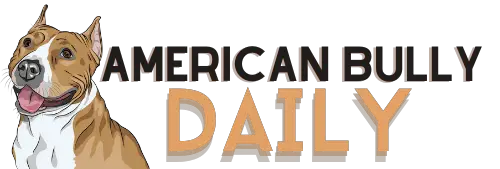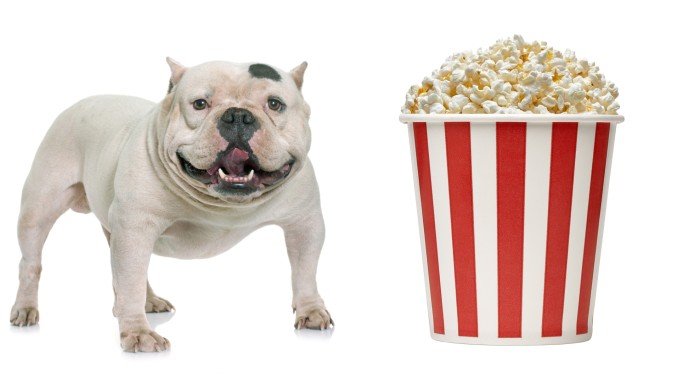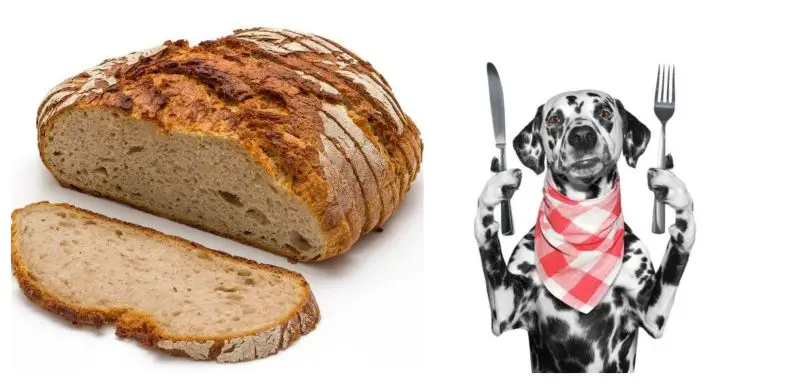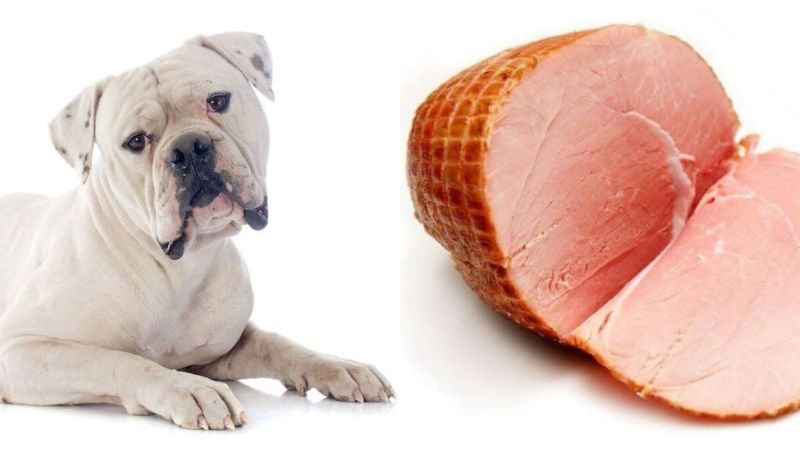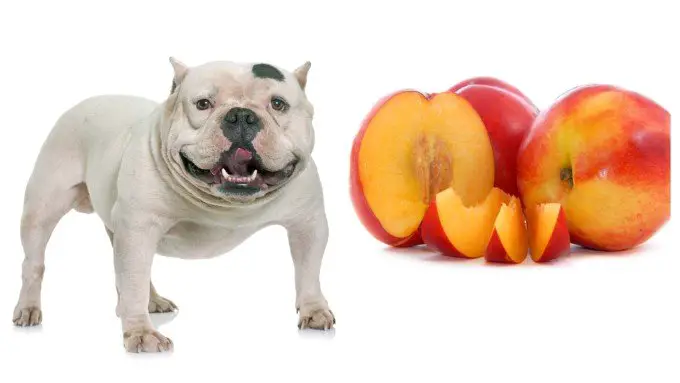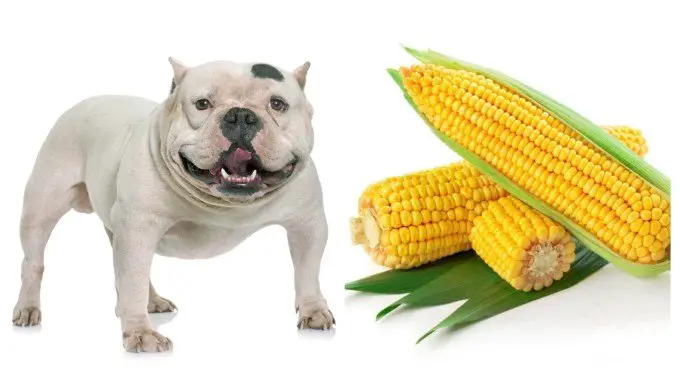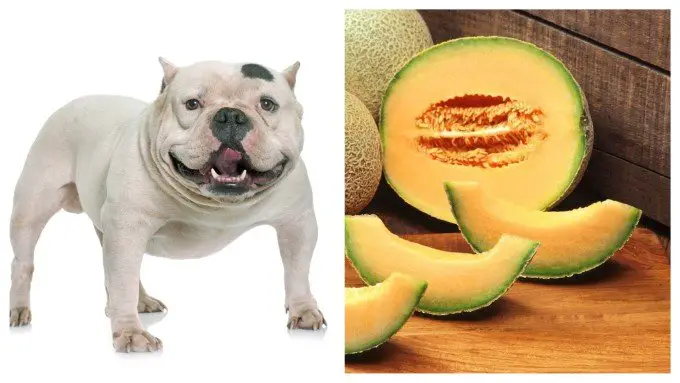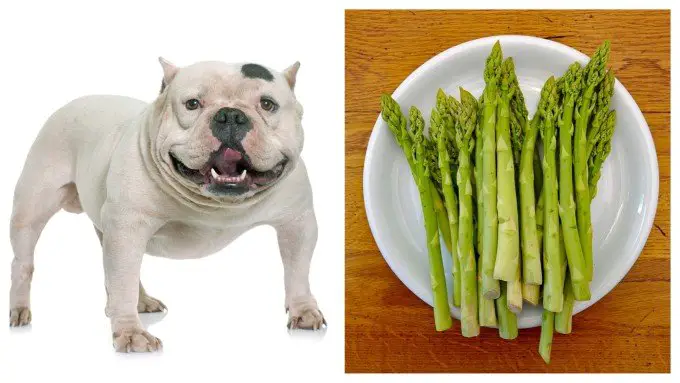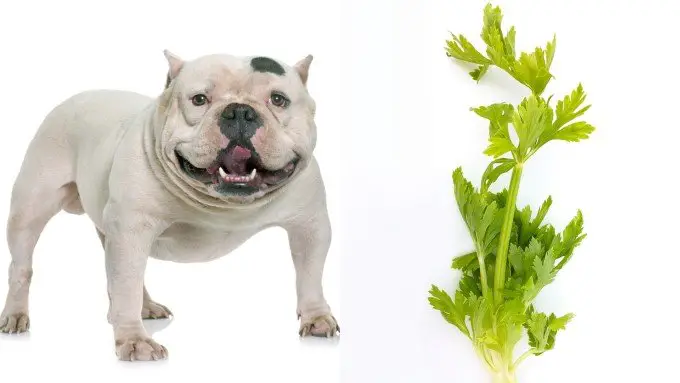Popcorns have always been known to be a great snack, especially when you’re in the cinemas or just lounging around the living room. Popcorn, derived from the word popped corn, is another kind of corn kernel that expands when it is heated.
With that said, popcorns are a kind of food that we, humans, enjoy. As much as we love our dogs to taste the kind of saltiness and savory popcorn gives – the main question is, can dogs eat popcorn?

The next time you’re lounging around your living room with your dog and he looks at you with his soft, puppy dog eyes, you should probably first consider if what you’re going to give him is safe for his health. After all, health is wealth and it will always come first — even for dogs! So now, the question remains, is popcorn safe for your dog to eat?
According to the American Kennel Club (AKC), an organization that is recognized and trusted in the breed, health, and training information for dogs, popcorn is not bad for your dog! The kernels actually contain several minerals which your dog can benefit from. These nutrients are magnesium, manganese, phosphorus, zinc, fiber, and some trace amounts of vitamins.
Popcorns are actually best partnered with butter and loaded with salt; however, it’s really not good for our health. And this is the same as your pup, too! While popcorn is safe for dogs, butter, oils, and salt isn’t. These could also contribute to obesity and obesity-related health problems such as cardiac diseases.
Because of the vitamins and minerals your dog can get from popcorn, it’s not really considered to be toxic for your dog! In fact, corn is often mixed with dog food because it’s cheap and adds dietary fiber and calories. What makes it toxic is what we put on air-popped popcorn or microwave popcorn. So if you’re still doubtful if it’s really safe for your dog — it is! Just don’t microwave popcorn to reduce the amount of heat radiation your dog will get.
There are always two sides to the story, and this is the same with dogs eating popcorn too. Since we’ve tackled how the AKC approves of giving your dog popcorn, other people say it isn’t safe to give your dog popcorn. Why is this so?
For one, it’s not really the healthiest snack you can offer to your dog. There are other healthier alternatives that you can let your dog eat. Popcorn and its kernels can actually get stuck in between the teeth of your dog. When it’s not removed or brushed properly and left for quite some time, these can lead to gum disease or dental decay.
Aside from that, since it’s just really small, you would expect that it would be easy to chew. It actually is! However, it’s a double-edged sword. Since it’s extremely easy to chew, it’s also very easy for your dog to choke on. Also, if you’re looking to improve your dog’s digestion, you shouldn’t be feeding him popcorn because it takes some time and effort before their stomachs could digest them fully.
Going back to the main question, your dog can eat popcorn! However, it’s really up to your judgment if you should give one to your dog. Everything’s good with moderation and this is one of those instances wherein it can be applied. It’s an inexpensive way to reward your dog for doing a great job, so there’s really no problem in depriving him of one! You can check our other guide about if corn is safe for your pets.
Can My Dog Eat Popcorn Kernels?
Yes, your dog can eat popcorn kernels. Aside from it’s actually more of a treat for them, not to mention an inexpensive one too, these foods contain vitamins and minerals which your dog needs daily!
According to Dr. Jennifer Herring, the DVM and director of emergency and critical care services at the Veterinary Specialty Center in Chicago, accidental ingestion of just a few pieces is generally harmless for dogs unless they have had some history of other diseases. With this said, she advised that dogs should only be fed small quantities of popcorn to avoid harmful effects, which are mostly related to their gastrointestinal system.
When it comes to giving them popcorn kernels, it’s important always to know that moderation is key!
Can My Dog Eat Caramel Popcorn?
Popcorn, like ice cream, comes in different flavors. It can come unsalted, salted, or powder, such as cheese. One of the most commonly requested flavors is caramel popcorn. Caramel popcorn is a confection or a sweet treat made of popcorn coated with sugar or molasses based caramel candy shell. Typically, a sugar solution or syrup is made and heated until it browns and becomes thick, producing a caramelized candy syrup. This hot candy is then mixed with popped popcorn and allowed to cool. Read also our honest Review on Low Fat Dog Foods.
So, caramel popcorn is actually great for those sweet tooth people out there. But can your dog eat caramel popcorn?
If popcorn kernels aren’t really toxic for dogs, caramel is. Hence, caramel popcorn isn’t the treat you should give for your dog. Why? It’s because of its composition, which is mostly raw sugar or molasses. Sugar can cause dental disease, obesity, and diabetes in dogs (as it does in humans). If your dog consumes too much sugar, you might see a change in behavior such as hyperactivity or difficulty concentrating, followed by lethargy or irritability.
Sugar, in all forms, is bad for dogs. This is because dogs shouldn’t intake an excessive amount of sugar. Aren’t chocolates one of the biggest dangers you could give to your dog? In this case, chocolate is made up of sugar and sugar is what makes up caramel popcorn. In that sense, it can be attested that caramel shouldn’t be given to your dog. The sugar found in caramel simply isn’t good for your dog’s overall health and wellbeing. While it’s not considered poisonous or toxic, too much sugar can absolutely make your dog sick and create long-lasting health issues that can sometimes be difficult to bounce back from quickly.
How Much Popcorn Can My Dog Eat?
It has been established that you can let your dog eat popcorn but in moderation. But how much is moderate? This is where some people actually have problems because what might be moderately for you isn’t considered moderate for everyone else.
There’s really no certain amount on how much popcorn your dog can eat. To be safe, just a half of a cup would do! But if you think your dog can tolerate more, then you have to be wary of his behavior. Make sure that you should take note of these possible warning sides that your dog has ingested too much:
- Choking
- Kernels getting stuck in between your dog’s teeth.
- Diarrhea
- Dehydration
Possible side effects and hazards to your dog from eating popcorn
There are actually just sometimes when you just can’t resist your dog’s puppy eyes, or maybe you’re not just a fan of tough love, or you think that your dog deserves some treat, too! But whatever the reason may be, if you feed your dog either intentionally or unintentionally, there are certain possible side effects and hazards your dog can experience when he or she eats popcorn.
Digestive issues can lead to diarrhea. Because corn isn’t really the typical dog food you should give to your dog, your dog’s system isn’t used to the substance that’s entering the body. Hence, it would take some time for them to digest it properly. When it takes too much time in your dog’s system, his regular bowel movement could be affected and could even lead to constipation. Here are the common symptoms you should look out for to know if your dog is constipated:
- Circling, frequent squatting without results, scooting (dragging bottom along the floor)
- No sign of bowel movement for two days or longer
- Crying or showing signs of pain and discomfort during bowel movement
- Hard and dry stools
- Lack of appetite
- Vomiting now and then
Dehydration from too much salt. This is one of the possible side effects which your dog can get from eating buttered or salted popcorn. Some of the warning signs you should observe are:
- Loss of appetite
- Reduced energy levels and/or lethargy
- Panting
- Sunken, dry-looking eyes
- Dry nose and gums
- Loss of skin elasticity
Possible kidney damage (from eating too much salt). Again, this would be an effect from salted or buttered popcorn. You should take note of these symptoms if you think your dog has ingested too much salt:
- Vomiting
- Lethargy
- Diarrhea
- Constipation
- Depression
- Weight loss
- Increased thirst
- Lack of appetite (anorexia)
Obesity. When your dog is acquainted with popcorn, it could be possible that he could crave for it too especially if it becomes his favorite! In this sense, it could lead to obesity in the long-term run from eating too much popcorn. Popcorn is high in fat. Fat, when not burned properly (also known as if you have a lazy dog), can be stored into its body and could eventually cause obesity. Some of the telling signs of obesity in dogs include the following:
- Weight gain
- No or little visible waistline
- No palpable ribcage
- Excess body fat
- Distended abdomen
- Lack of grooming
- Lack of mobility
- Lethargy
Alternative Treats to Popcorn
Air-popped and unsalted popcorn is a relatively safe choice for dogs. These are better options than caramel popcorn or those with powders in them. However, if you’re still wary of giving these to your dogs, here are some other alternatives to popcorn. Make sure to read our review on Best Dog Food For Pitbulls. and Dry Dog Food For American Bulldog.
For safe popcorn recipes for your dogs:
Plain and air-popped popcorn – To air-pop the kernels, you can use either a pan on the stove or a popcorn machine. Try to shy away from the microwave as it can give off the kernels some radiation which isn’t good for your dog
Cheesy bacon popcorn – Spread your popcorn on a lined sheet, cover it lightly with reduced-fat grated cheddar and bacon bits. Cook it at 350 degrees and wait until the cheese melts. Set it aside and let it cool.
Peanut butter poppers – Mix a half cup of popcorn with 1 cup of low-sale, low-sugar peanut butter, and extra virgin olive oil. For this, we recommend homemade peanut butter to ensure that it doesn’t contain Xylitol. Form small balls and put them on the baking paper and leave them to cool and set.
Other fresh snacks you can give your dog:
If you’re trying to shy away from popcorn, you can opt to choose these snacks instead.
Apples – Apples are actually a good source of fiber, vitamin A and C for your dog. Before you serve it, you should cut out the seeds first and the core before feeding it to your dog as it can be considered as choking hazards.
Bananas – Bananas are a good source of potassium, manganese, vitamin B6, vitamin C, fiber, biotin, and copper. These are also low in sodium and cholesterol but should be given moderately because of its sugar content.
Summary
When it comes to popcorn, you can surely give your dog some pieces but only as a treat! Also, keep in mind that you cannot put too much salt or butter into the popcorn as it could cause kidney and heart diseases to your dog. Aside from that, caramel popcorn variants cannot be fed to your dog as it could have a high sugar content, which is deadly for your dog.
There are certainly a lot more foods and snacks you can serve your dog without having to be a hazard for his health. Sure, it’s kind of a pain to resist the puppy dog eyes, but if you truly care for your dog’s health, you’d skip junk food such as popcorn and opt for healthier alternatives.
